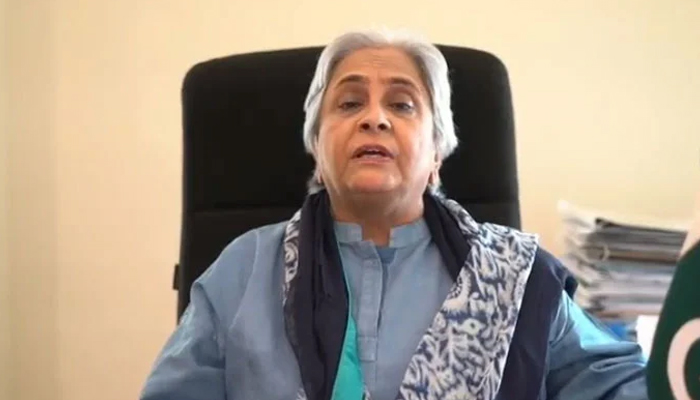Sindh’s hospitals to have biometric attendance system, says Azra
Sindh Health Minister Dr Azra Fazal Pechuho on Wednesday announced several reforms aimed at improving the province’s healthcare system, including measures to curb staff absenteeism, establish biometric systems across hospitals, and address critical shortage of anaesthesiologists.
In a press conference on Wednesday, she explained steps the health department was taking to upgrade services and tackle ongoing issues, such as the fake domiciles scandal in Lyari’s Male College of Nursing and objections to the Human Milk Bank initiative.
Dr Azra confirmed that biometric attendance systems would be rolled out across all hospitals in Sindh to address chronic staff absenteeism. She added that teaching hospitals would soon see the establishment of simulation labs to enhance practical training for healthcare professionals.
The health minister also highlighted that the Sindh Public Service Commission had initiated the process of recruiting doctors, while the hiring of paramedics and other staff would begin following court orders. In a related move, she said, the health department was preparing to release funds for medication supplies at Jinnah hospital and the process would be streamlined to prevent shortages in the future.
Discussing a recent scandal at Lyari’s Male College of Nursing where students were admitted on fake domiciles, the minister confirmed that an inquiry was under way, and that those responsible would face strict action.
“The students with fake domiciles have been expelled, and the involved health department officials will also be held accountable,” she said, adding that the protests that followed these expulsions had escalated into violence.
On the issue of maternal and infant health, she stressed the need for the Human Milk Bank, which had faced opposition due to concerns over the Islamic concept of milk kinship. The health minister noted that the department was working closely with the National Database & Registration Authority and Council of Islamic Ideology to resolve these concerns.
“We have reached out to NADRA to consider amending the family tree to account for milk kinship. The issue has also been raised with the prime minister,” she said. Highlighting the importance of breast milk for newborns, she warned of the health risks associated with formula milk. She said formula milk should only be provided on a doctor’s recommendation.
Turning to Sindh's ongoing battle with vector-borne diseases, Dr Azra said that during this year, 140 PCR-confirmed cases of chikungunya had been reported. However, she noted that the situation with malaria had improved significantly. She advocated for larvicide campaigns to prevent mosquito breeding, pointing out that fumigation alone was not a comprehensive solution.
She also addressed the issue of longstanding shortage of anaesthesiologists that had even forced the closure of intensive care units (ICUs) in some hospitals, and stated that recruitment process had begun.
“We aim to create a system where anaesthesiologists working in private hospitals also take on cases in public hospitals, to ensure that no ICU remains non-functional,” she said. Dr Azra also announced that 17 medico-legal officers had been recruited for Karachi, with a majority of them being women. She added that the Civil Hospital, Karachi, the province’s second-largest medical facility after Jinnah Hospital, was set for a major upgrade, including the construction of two new medical towers.
She also discussed the planned expansion of Sindh’s e-pharmacy initiative, which was launched at the Civil Hospital. The programme would soon be rolled out to other hospitals across Sindh to ensure transparent distribution of medicines, she said. Dr Azra said Sindh had yet to report any Mpox cases, and assured that the health department was vigilant and prepared for any potential outbreak.
-
 Prince William Questions Himself ‘what’s The Point’ After Saudi Trip
Prince William Questions Himself ‘what’s The Point’ After Saudi Trip -
 James Van Der Beek's Friends Helped Fund Ranch Purchase Before His Death At 48
James Van Der Beek's Friends Helped Fund Ranch Purchase Before His Death At 48 -
 King Charles ‘very Much’ Wants Andrew To Testify At US Congress
King Charles ‘very Much’ Wants Andrew To Testify At US Congress -
 Rosie O’Donnell Secretly Returned To US To Test Safety
Rosie O’Donnell Secretly Returned To US To Test Safety -
 Meghan Markle, Prince Harry Spotted On Date Night On Valentine’s Day
Meghan Markle, Prince Harry Spotted On Date Night On Valentine’s Day -
 King Charles Butler Spills Valentine’s Day Dinner Blunders
King Charles Butler Spills Valentine’s Day Dinner Blunders -
 Brooklyn Beckham Hits Back At Gordon Ramsay With Subtle Move Over Remark On His Personal Life
Brooklyn Beckham Hits Back At Gordon Ramsay With Subtle Move Over Remark On His Personal Life -
 Meghan Markle Showcases Princess Lilibet Face On Valentine’s Day
Meghan Markle Showcases Princess Lilibet Face On Valentine’s Day -
 Harry Styles Opens Up About Isolation After One Direction Split
Harry Styles Opens Up About Isolation After One Direction Split -
 Shamed Andrew Was ‘face To Face’ With Epstein Files, Mocked For Lying
Shamed Andrew Was ‘face To Face’ With Epstein Files, Mocked For Lying -
 Kanye West Projected To Explode Music Charts With 'Bully' After He Apologized Over Antisemitism
Kanye West Projected To Explode Music Charts With 'Bully' After He Apologized Over Antisemitism -
 Leighton Meester Reflects On How Valentine’s Day Feels Like Now
Leighton Meester Reflects On How Valentine’s Day Feels Like Now -
 Sarah Ferguson ‘won’t Let Go Without A Fight’ After Royal Exile
Sarah Ferguson ‘won’t Let Go Without A Fight’ After Royal Exile -
 Adam Sandler Makes Brutal Confession: 'I Do Not Love Comedy First'
Adam Sandler Makes Brutal Confession: 'I Do Not Love Comedy First' -
 'Harry Potter' Star Rupert Grint Shares Where He Stands Politically
'Harry Potter' Star Rupert Grint Shares Where He Stands Politically -
 Drama Outside Nancy Guthrie's Home Unfolds Described As 'circus'
Drama Outside Nancy Guthrie's Home Unfolds Described As 'circus'




